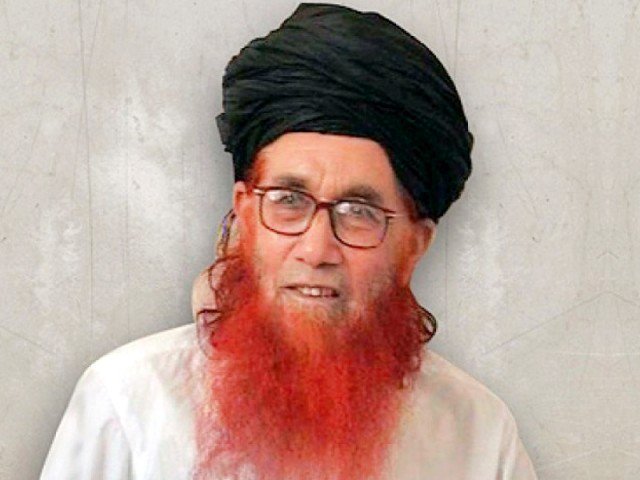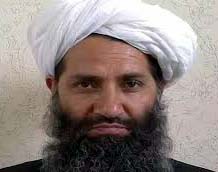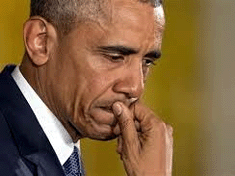Under-detention father of the Swati Taliban bites the dust

July 13, 2019: A year after the June 13, 2018 death of Pakistan’s most ruthless terrorist and the ameer of the Tehrik-e-Taliban Pakistan, Mullah Fazlullah in a CIA-manned drone attack in the Kunar area of Afghanistan, his father-in-law, Maulana Sufi Muhammad, who was the founding ameer of the banned Wahabi militant organisation – Tehrik-e-Nifaz-e-Shariat-e-Muhammadi (TNSM or the Movement for Enforcement of Islamic Shariah) – also breathed his last on July 11, 2019, in the custody of the Pakistan law enforcement agencies. Sufi Muhammad was released from prison by the Peshawar High Court in January 2018, mainly on medical grounds.
Sufi Muhammad had campaigned for decades for enforcement of his version of Islamic Shariah in the country, violently confronting the state in pursuance of this extremist agenda on several occasions. He had spearheaded a violent movement for enforcement of Islamic Laws in the Malakand division of Khyber Pakhtunkhwa in the 1990s and later led thousands of youths into battle against the US-led Allied Forces in Afghanistan in the aftermath of the 9/11 terrorist attacks and the subsequent invasion of Afghanistan. The 86-year old Sufi, who was in the custody of law enforcement agencies, died at an undisclosed location in Peshawar. He was taken to the Police Hospital in Peshawar early in the morning of July 11 where doctors pronounced him dead.
Sufi Mohammad was suffering from multiple ailments including diabetes and hypertension. His body was shifted to the Lal Qila area of Maidan in Khyber Pakhtunkhwa, where he was buried in his ancestral graveyard. Sufi was released on bail in January 2018 in two outstanding cases by the Peshawar High Court on medical grounds but was being kept by the law enforcement agencies at a safe house in Peshawar due to ‘security reasons’. Sufi’s wife also died of shock a few hours later, upon hearing the news of her husband’s death. Barkhanay Bibi, aged 62, was the third wife of Sufi, who had married her a few years ago after the demise of his two wives. Being the father of the Swati Taliban, Sufi Mohammad used to wield enormous influence in the picturesque Swat valley during the 1990s and 2000s. But towards the end of his jail term in January 2018, his extremist views softened considerably, as he had declared his most-wanted son-in-law, Mullah Fazlullah, an infidel and described his Tehrik-e-Taliban a terrorist outfit.
Droned in Afghanistan in June last year, Fazlullah was the third ameer of the TTP to have been killed by the American CIA. The first one was the TTP founder Commander Baitullah Mehsud who had been droned to death in South Waziristan in 2009 while his successor Hakeemullah Mehsud lost his life in a hit in North Waziristan in 2013. Mullah Fazlullah was the first TTP ameer to have been targeted in Afghanistan, although several key Pakistani jehadi commanders have been killed in the US drone strikes in Afghanistan in recent years including Commander Said Khan Sajna (killed in Feb 2018 in Afghanistan), Omar Khalid Khurasani (killed in Oct 2017 in Afghanistan), Hafiz Saeed Khan Orakzai (killed in July 2017 in Afghanistan), Mangal Bagh (killed in July 2016 in Afghanistan) and Khalifa Omar Mansoor Naray (killed in July 2016 in Afghanistan).
Coming back to Sufi Mohammad, he was a former member of the Jamaat-e-Islami Pakistan, and had founded the TNSM in 1989, along with some elders of Maidan area in Lower Dir. The group’s aim was to enforce Islamic Shariah in Malakand division, Hazara and Kohistan areas. The Maulana launched a civil disobedience movement against the state in 1994 while calling for enforcement of Islamic Shariah. But the drive was forcibly suppressed by the government. He was briefly detained by the state and made to stop his followers from continuing with the Shariah campaign. The Maulana once again gained prominence in 2001, when he motivated thousands of youths to cross the Pak-Afghan border to fight against the US-led forces in Afghanistan. He ultimately took around 10,000 poorly armed volunteers and followers to Afghanistan to take on the US-led Allied Forces along with the Afghan Taliban.
However, the Afghan Taliban suffered a heavy defeat at the hands of the Allied Forces and the Maulana, after losing thousands of his followers, returned to Pakistan. He was subsequently arrested in 2002, while crossing over into Pakistan at Parachinar. Hundreds of his supporters were killed in northern Afghanistan when the US forces bombed Taliban positions. Many of the volunteers from Malakand and tribal regions were captured during combat operations in Afghanistan. Yet, nobody was made accountable for misleading the youth. Sufi Mohammad, subsequently convicted under the Frontier Crimes Regulation (FCR) – was released from Dera Ismail Khan jail under a peace agreement with the provincial government of KPK on April 21, 2008.
The peace agreement followed another peace agreement between Mullah Fazlullah and the ANP-led government in 2009. All the cases against Sufi and his key associates were withdrawn under the agreement as per which Fazlullah was to renounce violence. However, the peace deal with Fazlullah could not last longer and the cases against the TNSM chief and his men were revived. As Fazlullah’s private army let loose a reign of terror in the Swat valley in a bid to enforce Shariah, a massive military operation was launched in Malakand division, which led to the re-arrest of Sufi from the Sethi Town in Peshawar along with his three sons in July 2009. Fazlullah had already been made the ameer of the Swat chapter of the Tehrik-e-Taliban Pakistan by that time.
Sufi was imprisoned in the Central Prison, Peshawar, and had to face trial in over a dozen cases of murder, treason, terrorism, and rebellion. But the Peshawar High Court set him free on bail on January 8, 2018 – after seven years of incarceration – since his lawyers took the stance that such an old man who is suffering from various diseases could not be kept in prison for so long a time, adding that no case had been proved against him during all those years.
Maulana Sufi Muhammad was born in Maidan area of Lower Dir district in Malakand Division in 1933. He received his early education at Panj Pir in Swabi and then completed his religious education in 1959 from Darul Uloom Haqqania, located in Saidu Sharif, headquarters of the Swat district in KPK. After receiving his madrassa degree, Sufi returned to his native village and started preaching an extremist version of Islam in mosques and madrassas. Although he had been to a Deobandi madrassa, his long association with Arabs and Afghans during the days of the Afghan jehad against the Russian occupation forces brought him quite close to the strict Wahabi school of thought.
According to his close circles, Sufi was not a traditional religious scholar occupied with teaching Islamic duties to a local community. Instead, he was motivated towards establishment of a Shariah-based Islamic society where everything from daily life to governance and social services could be administered through the implementation of Puritan Islam. He wanted to play a lead role in this regard, which led him to join Jamaat-e-Islami, a hard-line Islamist party with great influence in several districts of Malakand, Swat and Dir. He remained an active member of the Jamaat for years and also participated in the CIA-sponsored Afghan jehad against the Soviet forces.
But having returned from Afghanistan after the withdrawal of the Soviet forces, Sufi decided to quit Jamaat-e-Islami over sharp differences with his party’s central leadership on the issue of electoral politics. He was of the view that there is no place for democracy in Islam and that any party or individual participating in the election process should be regarded as un-Islamic and non-Muslim. This was despite the fact that Sufi Mohammad had himself contested elections, winning a seat on the district council of Dir district on a Jamaat-e-Islami ticket after which he had been representing his Maidan constituency for a while. He then launched his own organisation on June 28, 1989.
Primarily a Wahabi militant organization, the TNSM’s goal was quite clear since its creation – the implementation of a strict version of Islamic Shariah in the entire Malakand region, which includes the districts of Swat, Buner, and Upper and Lower Dir. Therefore, the TNSM gradually emerged in the Malakand and Swat divisions as a private militia to reckon with. Sufi was a Tajik by origin and the father of 13 sons and six daughters from two wives. One of his sons, Maulana Kifayatullah, was killed during a gun battle when the Pakistan Army had surrounded a village in Upper Maidan area during a military offensive on May 7, 2009.
The military operation had to be launched after Sufi’s refusal to accept the democratic government and the Constitution of Pakistan. Sufi chose the black turban and black flag as the insignia of his pro-Taliban group, leading to their nickname, “The Black Turbaned Brigade”. The TNSM was one of the five militant organisations proscribed by the Musharraf regime on January 12, 2002 under the Anti-Terrorism Act 2000. The TNSM motto is ‘Shariah ya Shahadat’ (Islamic laws or martyrdom) which rejects all political and religio-political parties for they follow the western style of democracy. The members of the TNSM, whose leadership openly condones the use of force in jehad, are identified by their shoulder-length hair and camouflage vests over traditional shalwar kameez clothing, being the trade mark of Sufi, which had become their identity.
Ideologically, the TNSM is dedicated to transform Pakistan into a Taliban style Islamic state. In the words of Sufi: “Those opposing the imposition of Islamic Shariah in Pakistan are Wajibul Qatal (worthy of death).” Just like his son-in-law, Sufi Mohammad also rejected democracy as un-Islamic: “We want enforcement of Islamic judicial system in totality: judicial, political, economic, Jehad Fi Sabilallah (holy war in the name of Allah), education and health. In my opinion, the life of the faithful will automatically be molded according to the Islamic system when the Islamic judicial system is enforced”, Sufi had declared in a speech in 2009 shortly before the military operation was launched in Swat and he was held on sedition and terrorism charges. But six years after being imprisoned, Sufi issued an informal decree against the Fazlullah-led TTP, declaring that the members of the Tehrik-e-Taliban lack the traits essential for a Muslim.
“They [TTP] do not come up to the definition of Momin and Muslim set by the Holy Prophet (PBUH),” Sufi had stated in a written ‘will’ released to the media on May 1, 2015. The computer-written will, having both Pashto and Urdu versions with his original signature placed in the end, was written in December 2014 – four days after the December 16, 2014 Army Public School carnage which killed 150 people, mostly schoolchildren. The extremist cleric had accused Mullah Fazlullah of bringing a bad name to the TNSM, besides killing many of its leaders and inflicting colossal loss on religious seminaries. But quite understandably, that was not at all a change of heart on his part. The fact is that ultra-rightist militants like Mohammad Sufi have always been opportunists of highest decree, switching loyalties to seek their ends whenever pushed against the wall.
In its July 13, 2019 editorial comment, Pakistan’s leading English newspaper Dawn rightly pointed out that there are lessons that the Pakistan state can learn from the life of Sufi especially his quest to violently take over and enforce ‘Shariah’ in parts of Khyber Pakhtunkhwa. “The reason Sufi Mohammad and Fazlullah were successful in creating havoc in Malakand region was arguably due to the absence of the state in the area. The lesson from all those areas which are affected by militancy in Pakistan, is that if the state fails to do its job, other actors will step in and there is no guarantee that they would be benign elements, working within the confines of the Constitution. To prevent the emergence of militant groups with extremist agendas, both the civilian and military arms of the state must prevent vacuums from being created”.
Amir Mir is a senior Pakistani journalist known for his research work on Islamic militancy and terrorism in Pakistan. He has authored several books including “Talibanization of Pakistan: From 9/11 to 26/11,” “The Bhutto Murder Trail: From Waziristan to GHQ,” “The True Face of Jehadis” and “The Fluttering Flag of Jehad.” He has also served as the Group Editor and Chief Operating Officer of several English and Urdu newspapers and Television channels respectively.




